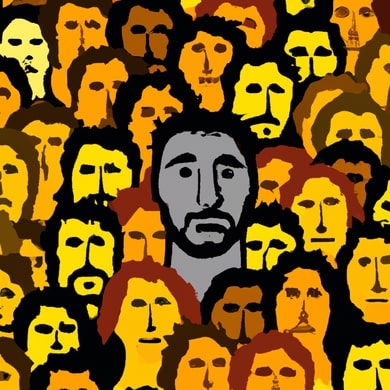|
Do you dread social situations? Is the idea of public speaking horrific, and does it feel like everyone is always watching and judging you? If so, you may be experiencing social anxiety.
When these symptoms are clinically significant, a psychiatrist may diagnose social anxiety disorder (SAD), which is a mental health condition that can leave people feeling isolated, lonely, and misunderstood. But the good news is that there are effective treatments available, and many people with SAD are able to manage their symptoms and lead fulfilling lives. In this blog post, we'll explore what SAD is, how to understand and process it, the different treatment options available, and ongoing management strategies. Whether you're struggling with SAD yourself or want to support a loved one, this post will provide valuable insights and practical tips. Understanding Social Anxiety DisorderDo you feel nervous meeting new people, giving presentations, or attending parties? If so, you're not alone. Many people experience some level of anxiety in social situations, but for some, social anxiety can be debilitating. In this section, we'll explore the difference between SAD and shyness, the challenges of underdiagnosis and undertreatment, and how to seek help for this treatable condition. The Difference Between SAD and ShynessSocial anxiety disorder (SAD) is often misunderstood and dismissed as just shyness or nervousness. However, while many people with SAD are shy or introverted, not all shy or introverted people have SAD. Shyness and introversion are common personality traits that don't necessarily interfere with daily life or cause significant distress. In contrast, SAD is a diagnosable condition that can significantly impair one's quality of life if left untreated. The Challenges of Underdiagnosis and UndertreatmentPeople with SAD experience extreme anxiety and self-consciousness in social situations, often fearing that they'll be judged or humiliated. Yet despite its prevalence and negative effects, SAD is often underdiagnosed and undertreated. Many people suffer in silence, feeling ashamed or embarrassed to seek help. However, getting help can make a significant difference in one's quality of life, and there's no shame in seeking it from a psychiatrist. In the next sections, we'll delve deeper into the symptoms and causes of SAD, as well as how to recognize them. Top Highlights
Causes of Social Anxiety DisorderNow we know what social anxiety disorder is, we might ask: what causes it? Like many mental health conditions, it's a combination of factors:
Recognizing Social Anxiety DisorderSAD is a complex condition that can manifest in a variety of ways, but there are some common symptoms to look out for. Here are some of the emotional, physical, and behavioral symptoms of SAD: Emotional Symptoms:
It's important to note that these symptoms can vary in severity and may not always be present. Some people with SAD may only experience symptoms in certain situations, while others may have a more generalized fear of all social situations. It's also important to differentiate SAD from other anxiety disorders, such as generalized anxiety disorder (GAD) or panic disorder. While these conditions share some similarities, they have different diagnostic criteria and treatment approaches. It's important to seek a professional diagnosis from a psychiatrist if you suspect you may have SAD or another anxiety disorder. If left untreated, SAD can have a significant impact on daily life. People with SAD may struggle to form meaningful relationships, perform well in school or work, or participate in activities they enjoy. They may also be at increased risk for other mental health conditions, such as depression or substance abuse. Evidence on the Prevalence of SAD
Treating Social Anxiety DisorderSocial anxiety disorder (SAD) can be a debilitating condition, but there are several effective treatments available, including medication, psychotherapy, and self-help strategies. While different treatments may work better for different people, medication can be an effective treatment option, particularly when used in combination with other treatments. In this section, we'll explore all the different types of interventions that can be used to treat SAD. MedicationMedication can be an effective treatment for social anxiety disorder. Different types of medications may be used to treat SAD, including:
PsychotherapyPsychotherapy can also be an effective treatment for social anxiety disorder. Different types of psychotherapy may be used to treat SAD, including:
Self-help strategiesIn addition to medication and psychotherapy, there are also a variety of self-help strategies that can be helpful for managing SAD. These strategies include:
Finding the right treatmentIt's important to note that treatment for SAD is not a one-size-fits-all approach. Different treatments may work better for different people, and it may take some trial and error to find the right combination of strategies. With the right treatment and support from a psychiatrist, many people with SAD are able to make significant improvements in their symptoms and quality of life. In the next section, we'll explore the prognosis and ongoing management of SAD, including relapse prevention and supporting loved ones. SSRIs as Effective Treatment for SAD
Prognosis and Management of Social Anxiety DisorderWhile social anxiety disorder (SAD) can be a chronic condition, many people are able to make significant improvements with proper psychiatric treatment and ongoing care in a supportive environment. Below are some strategies with proven effectiveness for ongoing management and relapse prevention. Ongoing ManagementManaging social anxiety disorder (SAD) over the long term can be challenging, but there are strategies that can be helpful for continuing treatment and reducing symptoms. Here are some key approaches:
Relapse PreventionWhile social anxiety disorder (SAD) symptoms may improve with treatment, they may still recur during times of stress or major life changes. Here are some strategies for preventing relapse:
Supporting Loved OnesFinally, if you have a loved one who is struggling with social anxiety disorder (SAD), there are several things you can do to offer support:
Empowering Interactions: Overcoming Social AnxietyThrough increased awareness, and by seeking professional help, individuals with social anxiety disorder can make significant strides towards a more fulfilling life. A tailored approach encompassing medication, psychotherapy, and self-help strategies has proven effective for many. In implementing these tips and insights, patients can effectively navigate their social interactions establish a robust support system. With commitment and persistence, those living with social anxiety disorder can overcome the challenges they face, ultimately enhancing their quality of life. Seeking help and working closely with a psychiatrist is an empowering step towards improved mental health and well-being. Embrace this journey with determination, and rediscover the joy of social connections. This blog post is brought to you by Apraku Psychiatry. Apraku Psychiatry is a private practice offering video appointments with Board-certified psychiatrists licensed in multiple states. More blog articles can be found here. To schedule an appointment with one of our psychiatrists, patients can complete the online booking form. Comments are closed.
|
Copyright © Apraku Psychiatry 2024


